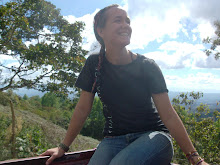Ever since I was younger I’ve always been intrigued by people with developmental disabilities. In fourth grade I remember the curiosity I had for my classmate who had a special tutor, and felt comfort in his friendship. From then on I found myself with different opportunities, always learning more about people with disabilities. So last year when I read about Jean Vanier and learned about the L’Arche communities that he formed in the 60’s, I was moved by his vision.
L’Arche was originally created as an alternative for institutionalization, which many years ago went hand in hand with human rights violations. Today the international organization creates permanent residencies- loving homes- for abandoned persons with disabilities. The values of L’Arche are quite beautiful, based on values of community, respect of the individual, developing one’s gifts, and strengthening one’s spirituality.
Knowing that there are two communities in Honduras, I was interested in seeing the strengths and weaknesses of a community in a developing country. In my past months I’ve found a strong sense of community in the face of poverty, so being able to experience an intentional community in the context of an impoverished country was exciting- for me, two things that go hand-in-hand. So on Saturday I ventured to Tegucigalpa, taking my first rapidito out of Guaimaca. I arrived later that morning to a community in Aldea Suyapa, in a house overlooking the city. (And of course being there, the community life felt natural. I asked one woman for how many years she had been with L'Arche. She looked at me and said- I don't know... this is my home.) When I arrived to Casa Nazareth, one of two houses in Tegucigalpa, I was warmly welcomed by its seven residents. The weekend was slow and gave me a good opportunity to learn how the organization’s values were lived out on a daily basis.
Weekdays are spent at the workshop, making different things for the store. Men are in charge of sanding mop handles and women make various crafts.
Before each meal, to start every work day, and every Monday night is prayer time. It was humbling to be part of their prayer services because they were so simply joyful. One woman led us in song with all of her strength (her face was strained the entire time) and complained of a headache afterwards. They just didn’t hold back.
Throughout my entire visit I was a bit frustrated with my inability to communicate. You would think after a year of living surrounded by Spanish speakers that I would’ve learned some more patience. A couple of the residents are unable to speak and rely mostly on gestures or grunts. It made me thankful for my understanding of Spanish and appreciative of other volunteers’ patience in learning Spanish. It also made me think back to my time at Harriman Lodge (a summer camp for adults with disabilities) where I met a man who relied on using a communication box. He told me of a time before he used the device when his caretakers plopped him in front of the tv when he wanted to be doing other things. He ended up writing a book and was on a news program for his efforts. Without that technology he was stuck in a world of frustration and misunderstanding. While this woman at L’Arche is cared for, I wish that she was able to feel that she could express herself more freely and that I could understand her. But despite the barrier, we connected and she shared her joy with me.
Another surprise, but inevitable due to the lack of resources, was that none of the staff (including the director) had received any kind of formal training for their work. They rely mostly on learning from their own experiences and from their co-workers. In fact, they were a bit surprised when I asked if any sort of pre-requisites were required. In the States we’re all about qualifications, certificates, titles. The director shared that they struggle to find willing people to dedicate their lives to L’Arche, so it makes it nearly impossible to find educated persons. (In reality, this goes back to Honduras’ larger problem: lack of a solid educational system that can empower its students to help to rejuvenate the country and a basic value for quality education.)
Something that I’ve frequently observed throughout the year is acceptance. It is an empowering notion when a person is accepted for who they are, but when there’s no reflection, development, challenge, to offer the best of what you have, then acceptance becomes stagnant. In L’Arche they lacked the development of the individual’s gifts. It may have been hard for me to see in my short stay, but it seemed like the community needed more intentionality and guidance.
But while the house lacks a lot of resources, it does offer a lot of love and a dignified life to its members. And I certainly learned a lot. It was a pleasure to have been able to experience L’Arche as I did and to remember the gift of people with disabilities and the simple ways that they can transform others’ lives.
And being away always makes me thankful to return to a loving community, where I was greeted with familiar faces. Just over a week until Chris and I begin our travels to El Salvador and then Guatemala!

